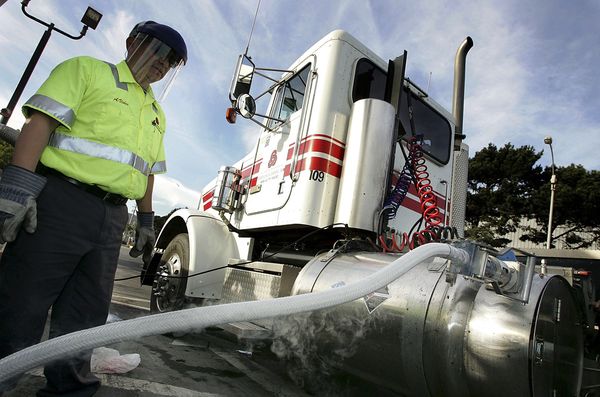While listing the benefits of transitioning a fleet to natural gas is easy, actually going through with a fleet conversion requires thorough research and analysis. For those fleet managers seeking to move from gasoline to a cleaner fuel source like natural gas, the task may at first seem overwhelming.
If you are a manager considering transitioning your medium-duty fleet to natural gas, Work Truck Magazine recently published an article that will provide advice and clarify the process. In an attempt to answer many of the common questions that come along with natural gas fleet conversion (i.e. What is involved with acquiring natural gas trucks? What should fleet managers expect with order logistics and delivery times? What are the factors to consider with fueling and service infrastructure?), Work Truck spoke with experts at Clean Energy, Freightliner, Cummins Westport, GE Capital Fleet Services, and Ryder to get their advice on these questions and more.
The experts provide sound advice on a number of issues:
On deciding whether the investment makes business sense:
“One of the key drivers is fuel use,” said Jeff Campbell, director of marketing for Cummins Westport Inc., which manufactures dedicated natural gas engines as a factory-direct option for several truck and bus OEMs (Original Equipment Manufacturer). “The higher the fuel use — in terms of both miles and engine hours — the better the business case.”
On deciding whether CNG or LNG is most suitable for your fleet:
“LNG is best suited for high-mileage applications where the fuel is consumed more quickly so that the fleet is not exposed to fuel venting (a characteristic of LNG),” said Perry of Ryder. “LNG fueling infrastructure is more limited than CNG, which also has an impact on the applications that can be supported. CNG is much more widely available and provides a lower cost per diesel gallon equivalent and overall operating costs under current conditions.”
On acquisition logistics:
“The availability of factory-converted natural gas trucks is limited and thus the fleet’s OEM [purchase] agreements will drive some of the decision,” said Ken Gillies, manager of truck purchasing and engineering for GE Capital Fleet Services. “Where possible, the factory-converted vehicles tend to increase customer confidence in the vehicle’s overall performance.”
On creating a fueling strategy:
If a fleet is one where trucks “return-to-base” at the end of each shift, private onsite fueling might be a practical option.
“When trucks come home every night, the drivers can park the vehicles in the yard, snap on the CNG nozzle hooked to a time-fill station, and then walk away,” said Peter Grace, senior vice president, sales and finance, Clean Energy Fuels Corporation, a provider of natural gas fuel for transportation in North America.
Finally, on maintaining natural gas vehicles:
“Fleet managers must look at what sort of modifications they need to do to their garage or service bays to ensure their shop complies with government standards for working with natural gas vehicles,” said Grace. “The ventilation has to meet certain standards and the heating systems have to be modified because if there is a gas leak, that can create a fire hazard.”
To read the whole article for more useful information, click here.

